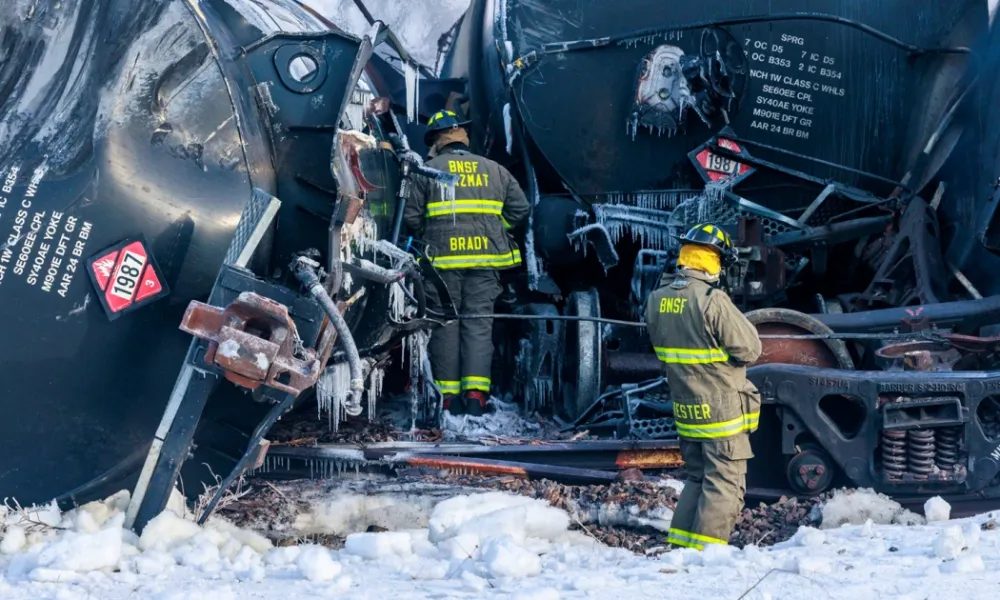Legislative
Remote trains carrying hazmat fall outside Congress’ push for rail regulation

Congress said it intends to push for legislation mandating a specific crew size on trains following several dangerous incidents. But the legislation leaves out a type of train that regularly carries hazardous chemicals in major metropolitan areas with no licensed engineers onboard.
Union Pacific, among other rail companies, operates remote-controlled locomotives (RCLs) for short distances in and around rail yards in places like Houston, Denver and Tucson, Arizona. The trains can carry chemicals like acidic poison, ethanol and sulfuric acid. And the Railway Safety Act of 2023 won’t stop the practice because of the bill’s exceptions for trains that “do not travel farther than 30 miles from the point of origin,” among other exceptions.
Union Pacific has for 20 years used workers who are not licensed engineers or conductors to operate these trains using remote joysticks. The workers are required to have only two weeks of remote operation training, as opposed to six months or more for conductors, to move these trains between rail yards.
The company became the second major railroad this week to drop a longstanding push for one-person crews aboard trains, joining Norfolk Southern, as a group of bipartisan lawmakers eyes an overhaul of the rail industry, which includes mandatory two-person crews on long-haul trains.
But what the lawmakers’ bill leaves out sheds new light on the parts of the rail industry that remain lightly touched by regulation, in the wake of major disasters like the train derailment in East Palestine, Ohio, that spilled 1.6 million pounds of hazardous chemicals, despite that train having an engineer, a conductor and a trainee onboard.
“We felt that the meat of the problem was ultimately long-haul trains with very long cars, and that’s where you see most of the problems in terms of transporting hazardous materials,” Sen. JD Vance, R-Ohio, who cosponsored the legislation, told NBC News on Thursday. “We’re certainly open to looking at alternatives,” he added, saying the legislation was crafted in the office of Sen. Sherrod Brown, D-Ohio, and rail companies had “no input” in the process.
Two engineers and conductors who work for Union Pacific and who spoke to NBC News on condition of anonymity say the company is looking to “dramatically” expand its use of RCLs.
Union Pacific did not respond to NBC News’ request for comment about the expansion of RCLs. Instead, Kristen South, senior director for the company’s media relations team, said, “We are currently using the technology to move cars between two rail yards in the Houston area in full compliance with the Federal Railroad Administration’s guidelines.”
In a statement, the Federal Railroad Administration said, “There are no specific concerns with the use of remote-control operators.” The agency also said that rail carriers self-report incidents that occur on their railroads, but only if damages total more than $11,500. They are required to submit reports to the Federal Railroad Administration, which then audits the reports but does not separate the data in terms of manned or unmanned trains.
At least three minor accidents have been reported in and around the rail yards northeast of Houston in the past decade.
Terry A. Hurlbut has been a student of politics, philosophy, and science for more than 35 years. He is a graduate of Yale College and has served as a physician-level laboratory administrator in a 250-bed community hospital. He also is a serious student of the Bible, is conversant in its two primary original languages, and has followed the creation-science movement closely since 1993.
-

 Executive4 days ago
Executive4 days agoSecret Service chief gets no solace
-

 Executive3 days ago
Executive3 days agoWaste of the Day: Louisville Taxpayers Pay Nearly $600,000 For Empty Building’s Maintenance, Security
-

 Guest Columns5 days ago
Guest Columns5 days agoFear Itself: Democrats’ Favorite Strategy Caused Their Current Chaos
-

 Executive3 days ago
Executive3 days agoWhere is Joe Biden – or Jill?
-

 Executive2 days ago
Executive2 days agoWaste of the Day: Throwback Thursday: Cities Used Crime Prevention Funds on Soccer Games, Paper Shredding
-

 Executive2 days ago
Executive2 days agoFacile and politically motivated suggestions
-

 Civilization5 days ago
Civilization5 days agoBuild Iron Dome in the United States To Prepare for Israel’s Worst Day
-

 Executive2 days ago
Executive2 days agoBiden makes farewell whisper


